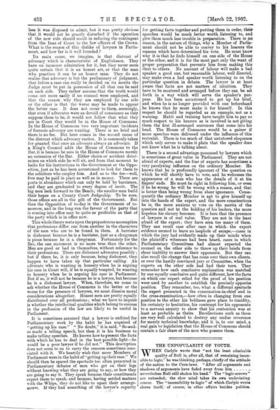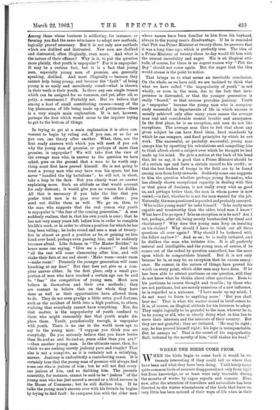THE UNPOPULARITY OF YOUTH.
WHEN Carlyle wrote that " not the least admirable quality. of Bull is, after all, that of remaining insen- sible to logic," he was thinking, perhaps, chiefly of the attitude of the nation to the Corn-laws. "After all arguments and shadows of arguments have faded away from him nevertheless Bull still shakes his head." The " logic-arrows " are unheeded ; ' the slow mind takes its own undeviating. course. The "insensibility to logic " of which.Oarlyle wrote shows itself,.. of course; in other affairs besides politics, Among those. whose business is soldiering, for instance, or farming you find the same reluctance to adopt new methods,- logically proved necessary. But it is not only new methods which are disliked and distrusted. New men are disliked and distrusted, often illogically, even more. And what is the nature of their offence? Why is it, to put the question more plainly, that youth is unpopular? For it is unpopular. It may be a curious fact, but it is a fact that young men, especially young men of promise, are, generally speaking, disliked. And most illogically because they cannot help being young, and because the " fault" of being young is so easily and mercilessly cured—what is thrown in their teeth is their youth. Is there any one single reason which can be assigned for so common, and yet, after all, so petty, a resentment ? Probably not. But we believe that among a host of small contributing causes—many of the big phenomena of life being made up of pettinesses—there is a very simple main explanation. It is not, however, perhaps the first which would occur to the inquirer trying to get to the bottom of things.
In trying to get at a main explanation it is often con- venient to begin by ruling out, if you can, or so far as you can, one theory after another. What, then, are the first ready answers with which you will meet if you ask why the young man of promise, or perhaps of more than promise, is unpopular? We will take first the view of the average man who, in answer to the question we have asked, goes on the ground that a man to be worth any- thing must first have .proved himself. He is not going to trust a young man who may have won his spurs, but has never " handled the big battalions" ; he will not, in short, take a leap in the dark. But you clearly want an answer explaining more. Such an attitude as that would account for only distrust; it would give you no reason for dislike. All that is necessary if you take the line that you prefer tried men is to pass over the others ; you need not dislike them as well. We go on, then, to the man who suggests that the real reason why youth is unpopular is "the fear of the coming generation." A man suddenly realises, that is, that his own youth is over; that he has not very many years left before him in order to complete his life's work, or in order to obtain a position for which he has long been toiling ; he looks round and sees a man of twenty- five in almost as good a position as he, or gaining on him hand over hand, perhaps even passing him, and be suddenly becomes afraid. Like Solness in " The Master Builder," he hears some one saying, " Give me a chance !" And then " all the rest will come clamouring after him, and will shake their fists at me and "shout : 'Make room—make room —make room!' Presently the younger generation will come knocking at my door." But that does not give us a com- plete answer either. In the first place, only a small pro- portion of men who have reached a certain age can be said to " fear " the competition of young men. Most men believe in themselves and their own methods ; they are content to believe that on the whole they have done as well as their opportunities have allowed them to do. They do not even grudge a little extra good fortune, such as the accident of birth into a high position, to others, realising that everybody cannot have everything. Nor, for that matter, is the unpopularity of youth confined to those who might reasonably fear that youth might dis- place them. Youth, paradoxically enough, is unpopular with youth. There is no one in the world more apt to say to the young man : ' I suppose you think you are everybody. Do you seriously believe that you know better than So-and-so and So-and-so, years older than you are ? ' —than another young man. Is the ultimate cause, then, for which we are seeking merely jealousy pure and simple That also is not a complete, as it is certainly not a satisfying, answer. Jealousy is undoubtedly a contributing cause. It is certainly true that the young man of promise will always find some one who is jealous of him ; but he will not find every one jealous of him, and so disliking him. The juvenile nonentity, for instance, cannot be said to be " jealous " of the young man who has just scored a second or a third success in the House of Commons ; but he still dislikes him. If he talks the young man's success over with his "friends he begins by trying to find fault : he compares him with the older men whose names have been familiar to him from his boyhood, always to the young man's disadvantage. If he is reminded that Pitt was Prime Minister at twenty-three, he answers that it was a long time ago, which is perfectly true. The idea of a Prime Minister of twenty-three to-day would fill him with the utmost incredulity and anger. His is an illogical atti- tude, of course, for there is no cogent reason why " Pitt the Boy " should not come again. But the anger that the idea would arouse is the point to notice.
That brings us to what seems an inevitable conclusion. On the whole, as we have said, we are inclined to think that what we have called " the unpopularity of youth " is not wholly, or even in the main, due to the fact that inex- perience is distrusted, or that the younger generation is really " feared," or that success provokes jealousy. Youth is " unpopular" because the young man who is conspicu- ously successful in departments of life in which success is usually . achieved only after many years causes the average man real and considerable mental trouble and annoyance. In the first place, he is an exception, and men do not like exceptions. The average man likes to feel that about any given subject he can have fixed ideas, fixed standards by which he can compare, and fixed principles by which he can work. The successful, or probably successful, young man annoys him by upsetting his calculations and compelling him to think afresh about a subject over which he thought he had made up his mind. He gets a notion at the back of his head that, let us say, it is good that a Prime Minister should be of a certain age and have a certain record to his credit; or that the best leaders of troops in the field are to be found among men from forty onwards. Suddenly some one suggests to him the question whether perhaps young So-and-so, who has already shown exceptional capacity in dealing with this or that piece of business, is not really every whit as good as, and perhaps better than, the men in whom power is now vested,—in fact, whether he is not the man wanted for the job. Naturally, the man questioned is puzzled and probably annoyed. ' Who is this young man ? ' he asks himself. Ishe really more capable and trustworthy than the older, tried men I know ? What have I to go upon ? Is he an exception or is he not P Am I not, perhaps,, after all, being merely bamboozled by tinsel and charlatanry ? Why does this young man keep on insisting on his claims ? Why should I have to think out all these questions all over again ? Why should I be bothered with the fellow anyhow ? ' And so on ; he is really irritated, and he dislikes the man who irritates him. It is all perfectly natural and intelligible, and the young man, of course, if he comes out of the ordeal by question unscathed, has the more upon which to congratulate himself. But it is not only because he is, or may be, an exception that he causes annoy- ance. He cannot, in the nature of things, have proved his worth on every point, which older men may have done. If he has been able to attract partisans on one question, still they do not know what he thinks about other questions. Even to his partisans he causes thought and trouble ; by those who are not partisans, but are merely conscious of a new influence, he is regarded as a nuisance. I have made up my mind; I do not want to listen to anything more.' `But you shall hear me.' That is what the matter stated in brief comes to. It is, of course, an illogical attitude for his listeners to adopt. They ought logically to be grateful to the man, whoever he is, be he young or old, who is clearly doing what in him lies to serve their interests and the interests of their country. But they are not grateful ; they are irritated. He may be right ; nay, he has proved himself right ; his logic is unimpeachable. But he annoys us.' That is the secret of his unpopularity. Bull, irritated by the novelty of him, "still shakes his head."











































 Previous page
Previous page